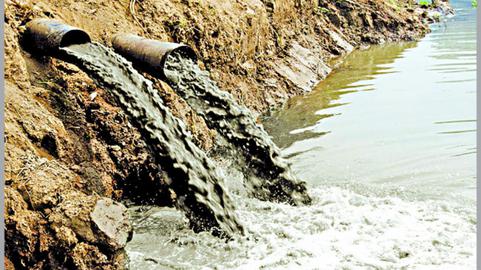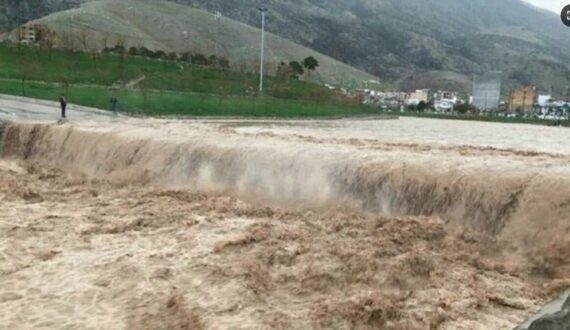Itanwire – Aras is a major river that flows along the border between Iran and both Azerbaijan and Armenia. A report published on June 19 by the Tehran newspaper Payam-e Ma about the possible connection between the pollution of Aras and the increase in the rate of stomach cancer in the north-western province of Ardebil has once again brought the issue of the river’s pollution to the attention of the public.

Pollution of Aras River and reservoirs has led to deep anxiety about food safety and the environmental health in Ardebil and East Azerbaijan provinces. Government officials are well-aware of the issue of pollution of the Aras River but either sweep it under the rug or downplay it.
***
No Question That Aras Is Polluted
Metal pollutants in the Aras River fall into two groups: radioactive materials and heavy metals. Iranian officials have repeatedly denied that radioactive materials from Armenia’s Metsamor Nuclear Power Plant have entered the river. On June 20, after the publication of the Payam-e Ma report, the National Center for Nuclear Safety announced that it found no trace of radioactive material in the river when it conducted analyses back in March.
The Metsamor Nuclear Power Plant was commissioned in 1976 and, according to many reports, it does not meet safety standards because of worn-out equipment at the facility and the devastating 1988 earthquake that killed at least 25,000 people.
The Aras River travels 150 kilometers from this power plant before reaching Iran. So it is not easy to prove that Metsamor is spilling radioactive material into the river, and Iranian officials have denied it. Nevertheless, many research papers have been published about the pollution of the Aras River as a result of the flow of radioactive material into its waters. One of these papers, “The effects of Aras border river pollution by countries of Armenia and Azerbaijan on the national security and interests of Iran”, was published last winter by the Journal of Border Studies, a publication of Iranian National Police Center for Border Research and Studies.
The radioactive pollution of the Aras River was also confirmed in studies published this spring by Kharazmi University’s Faculty of Geopolitical Sciences and Iran’s Chamber of Commerce. Nevertheless, Iranian government officials remain silent about this subject.
A “Political” River
Nasser Karami, climatologist and environmental researcher, tells IranWire that, considering the high rate of stomach cancer in Ardebil province in the past 20 years, speculations about radioactive pollution in the Aras River are not new. In 2020, the Health Ministry published a study showing that 50 per 100,000 residents in the province are diagnosed with stomach cancer every year, whereas the number for Tehran is around 18 and only seven for the Persian Gulf port of Bandar Abbas.
Karami says that Aras is a highly “political” river because it originates in Turkey and crosses Armenia, Iran and the Republic of Azerbaijan before flowing into the Caspian Sea, meaning that, besides these four countries, its pollution affects Russia, Turkmenistan and Kazakhstan as well.
This scientist says that the high number of dams, over-exploitation of water and discharging pollutants into the river have been a main subject of dispute among the countries where the Aras River flows. To protect the river, these countries need to sign a cooperation agreement, he says.
Order to Keep Silent
Local populations have witnessed the pollution of the Aras River for more than two decades. Sevil Suleymani, a sociologist, civil rights activist and a native of Moghan Plain in Ardebil province, tells IranWire that, around 20 years ago, the water in Aras River and the reservoir of Khoda Afarin Dam suddenly turned green at various junctures. On these occasions, local residents could clearly see the pollution, smell the stench and observe the death of aquatic animals, but no government agency has taken any effective action to prevent the flow of pollutants into the river from Armenia.
“Since 10 years ago, local officials have acknowledged that the river is highly polluted but, after complaints by the people and local activists, somebody from the governor’s office told them that they have been ordered to keep silent about it and say nothing,” says Suleimani.
Heavy Metal Pollutants and the Government’s Silence
Most of the disputes over the pollution of Aras relate to the wastewater that flows into the river from Armenia. And when the pollutants reach the reservoir of Khoda Afarin Dam, they also pollute drinking water networks and farmlands of the cities and villages such as Nurduz and Kordasht in Moghan Plain.
Dr. Reza Malekzadeh, director of the Digestive Disease Research Center at Tehran University of Medical Sciences and a former Health Minister, told the newspaper Payam-e Ma that water polluted by nitrates can cause cancer of the digestive system. And a report by the Science and Research Branch of Tehran’s Islamic Azad University confirms that nitrates in the Aras River are above the safe threshold. Many other reports confirm the existence of heavy metal particles and harmful chemicals above safe levels in Aras.
Most of the pollutants discharged into the Aras River come from copper and molybdenum in Armenia’s Agarak area. The density of aluminum and manganese in Aras is also higher than the safe threshold. More importantly, the high level of lead in the river poses serious danger to drinking water and fishing. Also, it has been found that the density of elements such as aluminum, arsenic, boron, copper, molybdenum and sulfur in the river has been increasing.
Despite numerous reports and statistics about the effects of the pollution of Aras River on people’s health, Torab Mohammadi, deputy governor of East Azerbaijan province, told Iranian Students’ News Agency (ISNA) that the wastewater from Armenia does not pose health threats to humans, and no radioactive material is entering the river from Armenia.
Dr. Hossein Sadrzadeh, oncologist and hematologist based in Boston, tells IranWire that if heavy metals enter the body above a certain level they can disrupt the body’s metabolism, and the accumulation of such metals in various organs such as liver, heart, kidneys and the brain can cause them to malfunction.
According to Dr. Sadrzadeh, the most serious danger posed by elements such as cobalt, chromium, nickel and arsenic is that they are carcinogens. He says that if heavy metals accumulate in the body above a certain level, they reduce the body’s resistance to infection, affect the nervous system and lead to kidney and glandular malfunction and infertility.
Dr. Sadrzadeh says that the Iranian government must conduct an accurate assessment of the pollution of the Aras River, identify the sources of pollution and take action to provide local residents with clean drinking water.
According to Dr. Sadrzadeh, people who live in areas where they are threatened by heavy metals, especially pregnant women and children, must be screened and monitored. In addition, the fish caught from these polluted waters must not be consumed, and the government has the duty to inform people about the threats to their health by providing them with correct and relevant information.
Making Pollution A Security Issue
Experts say that the government has either denied or completely ignored the facts about the pollution of the Aras River.
Shahin Modarres, an international relations and security analyst, tells IranWire that, as a result of the lack of effective and rational management, very simple and ordinary issues in Iran become strategic issues and these matters gradually turn into security problems.
Pointing to the problems created by the pollution of the Aras River by Iran’s neighbors, he says that the Islamic Republic “is unable to conduct multilateral diplomacy, negotiate with several countries and ask for guidance from international organizations. Instead it hides statistics and figures or denies them.”
Geographically speaking, Iran lies in the lowlands compared to its north-western neighbors and, as a result, all pollutants that enter the Aras River in Turkey, Armenia and Azerbaijan reach Iran. To get itself out of this situation, Tehran must follow an active, multilateral diplomacy to reach an agreement with Armenia, Turkey and Azerbaijan and cooperate on environmental issues.
But Modarres points out that tensions between Azerbaijan and Armenia have always been high and Baku has even threatened to attack Armenia’s nuclear power plant. “The Islamic Republic has also downgraded its diplomatic relations with the Republic of Azerbaijan. In such conditions it is not possible to follow an active diplomacy,” he says.
 Shabtabnews In this dark night, I have lost my way – Arise from a corner, oh you the star of guidance.
Shabtabnews In this dark night, I have lost my way – Arise from a corner, oh you the star of guidance.



